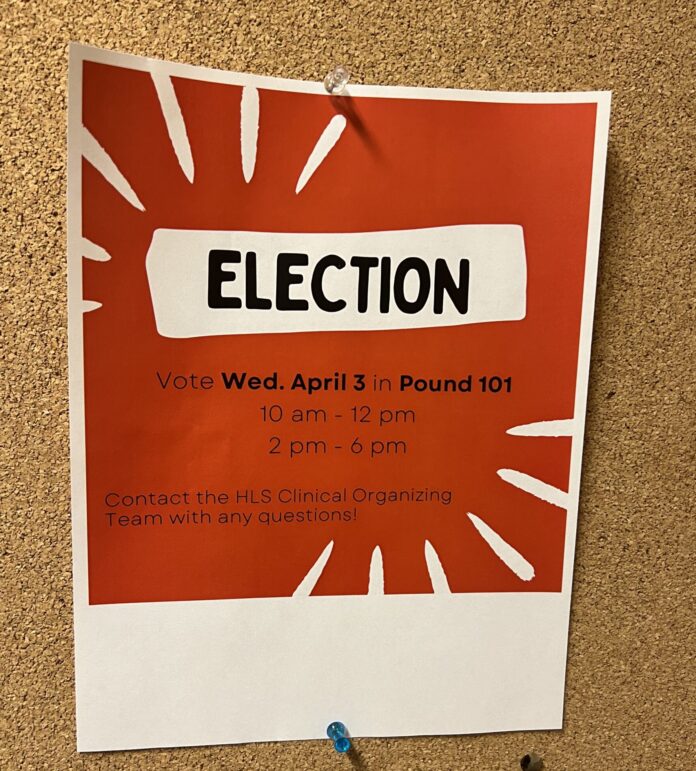HLS’s clinical workers will vote on whether to unionize tomorrow, April 3. The election, supervised by the National Labor Relations Board, will be held in Pound 101 between 10:00 AM and 12:00 PM and between 2:00 PM and 6:00 PM. Specifically, the ballot will ask HLS’s 96 clinical workers whether they “wish to be represented for purposes of collective bargaining by Harvard Academic Workers,” a Harvard-wide affiliate of the UAW.
Rebecca Greening, Lecturer on Law and Clinical Instructor at the Legal Service Center’s Family Justice Clinic, and a leader of the unionizing efforts, described the impetus for organizing. “There has been a growing sense in our clinical community that there were no other viable options to address the challenges facing our workers than collective action.” HLS, she said, bars many workers from tenure-track or tenure-like roles who at other law schools would be eligible, lowering their pay and encouraging them to seek opportunities elsewhere. While clinical instructors are able to advance to professorial status within the clinic system, this is restricted by the university’s policy of limiting clinical faculty positions.
She added that the law school administration has been resistant, compared to other Harvard schools, to unionization efforts. The administration, she continued, delayed nearly a month in pre-filing negotiations until the last minute negotiating with the unionizing organizers for a stipulated election agreement. If a majority of clinical workers vote yes on tomorrow’s ballot, the organizers will form a bargaining committee that will be able to more formally advocate to the administration.
As for the merits of organizing, Greening pointed to increasing responsibilities and stagnant pay, without the same administrative assistance as podium faculty, as reasons to organize. The lack of administrative power, she added, is inconsistent with the “increasingly critical role” clinical instructors play in students’ education. HLS’s “opaque decision-making process,” Greening said, undermines input from clinical instructors who also teach students how to be practicing lawyers.
Other clinical instructors air similar grievances with HLS leadership. John Fitzpatrick ‘87, a supervising attorney and Senior Clinical Instructor at the Harvard Prison Legal Assistance Project, said the unionization effort is an overdue response to clinicians’ dissatisfaction with HLS administrative leadership—in his words, up at “Mount Olympus.” A student member of PLAP in his time as a student in 1984 – 87, and as a clinical instructor there since the 1990s, Fitzpatrick said clinicians now “want to be allowed to sit at the HLS grown up table” for decision-making.
Fitzpatrick said HLS’s promotion of its 47 clinics and SPOs in its marketing materials reflects how aspiring students—and the legal community—increasingly consider this kind of experiential learning to be equal in importance to the “Langdellian learning”model that the HLS leadership still supports. The growing recognition of the importance of clinical education, he said, runs counter to what he describes as clinicians’ treatment as “second-class citizens” by HLS leadership, compared to podium faculty. For instance, he described requests for clinicians to volunteer as proctors for the podium faculty’s exams last semester as a particularly demeaning task.
To demonstrate this disparity’s impact on students, Fitzpatrick pointed to how he and a Lecturer on Law faculty member each separately supervised different students working on petitions for certiorari to the U.S. Supreme Court. Fitzpatrick’s group received some pro bono credit; the faculty member’s” students got classroom credit for J-Term. The arbitrary difference, merely dependent on his and the other certiorari petition supervisor’s differing titles, Fitzpatrick noted, “shortchanges our students.”
While symbolic sleights like encouraging podium faculty, but not clinical instructors to don regalia during graduation alone (and how clinicians annually receive emails from HLS leadership “inviting” them to help out with commencement logistics) can arouse resentment, Fitzpatrick continued to tie the clinicians’ campaign to students’ interests. He described how a student wanted to author a paper on prison law but had to be supervised by a podium faculty member with less experience than Fitzpatrick in the area because Fitzpatrick is “only” a Clinical Instructor, not a “Professor”.
Generally, Fitzpatrick said clinicians aim to be treated more like podium faculty, and less like second-class underlings. These demands include comparable tenure protections, sabbatical privileges, supported research and writing, and a direct channel of communication to administrative leadership. Pointing out clinical instructors’ and other clinicians’ (like Clinical Fellows) expertise in experiential teaching and their demand to be treated more like podium faculty, Fitzpatrick called tomorrow’s election “labor law in real life.”


